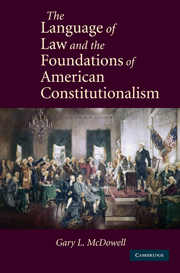Book contents
- Frontmatter
- Contents
- Preface and Acknowledgments
- The Language of Law and the Foundations of American Constitutionalism
- Introduction: The Politics of Original Intention
- 1 The Constitution and the Scholarly Tradition: Recovering the Founders' Constitution
- 2 Nature and the Language of Law: Thomas Hobbes and the Foundations of Modern Constitutionalism
- 3 Language, Law, and Liberty: John Locke and the Structures of Modern Constitutionalism
- 4 The Limits of Natural Law: Modern Constitutionalism and the Science of Interpretation
- 5 The Greatest Improvement on Political Institutions: Natural Rights, the Intentions of the People, and Written Constitutions
- 6 Chains of the Constitution: Thomas Jefferson, James Madison, and the “Political Metaphysics” of Strict Construction
- 7 The Most Sacred Rule of Interpretation: John Marshall, Originalism, and the Limits of Judicial Power
- 8 The Same Yesterday, Today, and Forever: Joseph Story and the Permanence of Constitutional Meaning
- Epilogue: The Moral Foundations of Originalism
- Index of Cases
- General Index
- References
3 - Language, Law, and Liberty: John Locke and the Structures of Modern Constitutionalism
Published online by Cambridge University Press: 05 June 2012
- Frontmatter
- Contents
- Preface and Acknowledgments
- The Language of Law and the Foundations of American Constitutionalism
- Introduction: The Politics of Original Intention
- 1 The Constitution and the Scholarly Tradition: Recovering the Founders' Constitution
- 2 Nature and the Language of Law: Thomas Hobbes and the Foundations of Modern Constitutionalism
- 3 Language, Law, and Liberty: John Locke and the Structures of Modern Constitutionalism
- 4 The Limits of Natural Law: Modern Constitutionalism and the Science of Interpretation
- 5 The Greatest Improvement on Political Institutions: Natural Rights, the Intentions of the People, and Written Constitutions
- 6 Chains of the Constitution: Thomas Jefferson, James Madison, and the “Political Metaphysics” of Strict Construction
- 7 The Most Sacred Rule of Interpretation: John Marshall, Originalism, and the Limits of Judicial Power
- 8 The Same Yesterday, Today, and Forever: Joseph Story and the Permanence of Constitutional Meaning
- Epilogue: The Moral Foundations of Originalism
- Index of Cases
- General Index
- References
Summary
In May 1652, only a year after Thomas Hobbes had shaken the intellectual world to its scholastic roots with his infamous Leviathan, John Locke was elected to Christ Church, Oxford. For the rest of his life, Locke would labor in the mighty shadow Hobbes cast, drawing out the implications of Hobbes's thought all the while denying any influence.
To say that the philosophic specter of Hobbes haunted the “thinkeing men of Oxford” in Locke's day is to understate the case. In 1683, at the very time Locke was immersed in the intellectual excursions that would eventuate in the Essay Concerning Human Understanding (1689) and the Two Treatises of Government (1689), in the last book burning held at Oxford, “Hob's De Cive and Leviathan” were deemed good fuel for the flames of scholarly intolerance. For Locke, the lesson was hardly ambiguous; the art of writing was far from being free of persecution. If the ages were not still dark, they were surely dim; enlightenment and toleration were for another day.
The Oxford that Locke entered was little changed from the one that Hobbes had left decades before. The arid scholasticism Hobbes had encountered and detested at Magdalen was still in control of Christ Church. Locke was no more impressed with the forms and substance of the tradition than Hobbes had been. To Locke, the tedious and pointless exercises in formal logic and rhetoric were mere “hogshearing.” The future philosopher seems to have preferred romance novels.
- Type
- Chapter
- Information
- Publisher: Cambridge University PressPrint publication year: 2010

